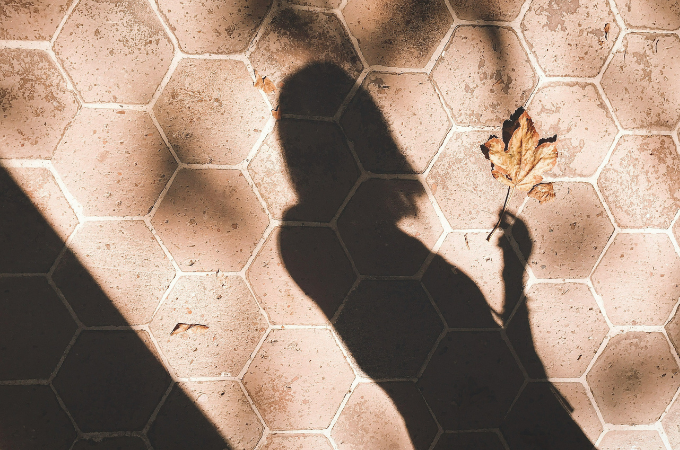
I can’t breathe… I’m going to die. My chest tightens as I stagger, my body trembling in my attempt to hold my weight up using the wall behind me. My heart races faster as my lungs constrict rather painfully. I try taking in gasps of air, but it only serves to worsen the pain and makes it all the more unbearable. Soon enough, I’m swept up in a throng of nausea and the hall ahead of me seems to be spinning vigorously.
“I… I can’t breathe…” I choke out, pleas falling redundant in the empty hallway, my voice tiny and broken. Clutching the front of my blouse, my voice becomes more urgent this time as my words come out in short gasps. “I… can’t… breathe…” I count ten to one backwards just as Mrs Zotam taught me to, and push through the continuous clatters of my teeth and the shivers that have overtaken my body.
Ten…
And just as I attempt to take in a final breath to wade away the waves of nausea and blackout that were about to attack, I feel a soft hand on my shoulder, forcing me to look up into the only eyes that brought me any form of serendipity. Yèyéẹwà—my saviour. Yèyéẹwà was quickly the most beautiful person I had ever seen. Her deep caramel-toned skin shone like that of a newborn baby’s buttocks and her eyes seemed to radiate a depth that seemed unusual for her young age. She proudly wore a shoulder-length afro that forced an unexpected jealousy on its beholder. Yèyéẹwà was an enigma, a formidable force that had blazed into my life most unexpectedly.
We’d become fast friends when I was fifteen–right around the time I had my first panic attack. Back then in boarding school, everyone had assumed that I was an attention seeker when the attack first came, forcing me to believe the same of myself. I had always been the outsider in my peer group – the one no one ever wanted to be friends with because of how weird I was. From a young age, I developed an awkward habit of talking to myself as a way to rationalise the minefield of thoughts going on in my mind’s world. And no one ever wanted to associate themselves with what they called “Wọ̀sọ́lá’s brand of crazy.” I mean it made sense; at that age, we only ever wanted to be the cool, laidback, and approachable person as a defence mechanism from the vile that teenage years seemed to be associated with.
But being an overweight Nigerian girl who only ever talked to herself – or “the spirits” like my classmates teased – was the greatest recipe for disaster in my case. But by the next Saturday morning before chores, Yèyéẹwà had perched herself on the corner of my bed, and her eyes blazed with intensity when she uttered those words that changed the trajectory of my social life, “You’re not crazy.” She didn’t know who I was on a personal level, but she seemed to trust my assertion that maybe I was just different – special – and her belief in me quickly drew us together. Yèyéẹwà had been a new transfer at Sacred Hearts Girls’ – at least that was what she had told me anytime I asked why no one seemed to know who she was. It had been easy to disregard their words when they didn’t care about me after all and chalked my questions up to my apparent insanity. And so I stopped asking around and instead chose to bask in the comfort her presence brought me.
Yèyéẹwa – ’ẹwa like I fondly called her – seemed to know when I needed her because even though we were not in the same year group at Sacred Hearts, she still showed up consistently. And slowly, we were bonded at the hips. I told her everything and some days wondered why she never told me anything. Regardless, our friendship was like a breath of fresh air. Her constant reminder of how much power I carried if only I stepped into it became an armour I weaponised against the caustic words the girls in my year threw at me. “You’re fine, Wọ̀sọ́,” she draws my attention to her eyes, using an index finger under my chin to bring my eyes to hers. I’d always described her eyes as the warmest I’d always known amid the unkindness that had only ever been doled out to me all my life. Her cold hand on my cheek brings me back into the present, as my breathing becomes stable.
One…
It was the final breath I took and at that moment, things seemed to return to normal. Mrs Zotam was right. I smile up at her as my heartbeat regularises. “Thank you, ’ẹwa. And I’m sorry for always being so dependent on you.”
She chuckles softly as I lean further into her now warm palm on my face, closing my eyes from the warmth her presence brings. “There’s no such thing as you being dependent, Wọ̀sọ́. You’re stronger than you think.”
“Can you stay a bit longer this time?” I ask, eyes looking into hers in the hope that they convey my need, as I wrap both my arms over my stomach.
Her smile is as soft as her words as she shakes her head before responding, “Your mum is coming soon and you know she doesn’t like me very much, so I have to go now.” Yèyéẹwà murmurs, resignedly letting go of my face as she turns away, “But I promise you, I’m with you always, Wọ̀sọ́, and anytime you need me, I’ll be here.” Those were her parting words as she sauntered gingerly under the alcove beneath the steps and disappeared from my sight. I smiled as I rubbed my temples. She always had a way of soothing the post-attack headaches that always overwhelmed me anytime she called me by the nickname she had attributed to me: Wọ̀sọ́. “Just like its literal meaning, your spirit settles mine,” was her justification for the nickname anytime I asked her why she’d chosen that variation of my name.
“Wọ̀sọ́lá? Wọ̀sọ́lá where are–” My mother’s voice, laden with confusion and worry, stops as her feet halt in front of me, breaking the momentary peace I felt from Yèyéẹwà’s earlier presence. Without looking up, I know what her reaction already is. It’s why I don’t meet her eyes. It’s the sole reason I slide further away from her, even though it feels like the breath in my lungs is on its way to being completely snuffed out all over again. I know how this routine goes; I’ve endured it for the past ten years. My mother hated me. It was a fact I’d known since I turned ten. Mrs Zotam had described our unfortunate relationship as one being driven by consistent miscommunication, but I knew in my gut that her hatred of me ran deeper than that. My father was never in the picture and she’d been orphaned at an early age, so there was no form of mediation between the hate she spewed and the child I’d wanted to be. For most of my life, it had always felt like I’d been in constant competition with her. She’d berate me over the slightest things, issues she never worried about when handling my brothers. Even when I’d been bullied about my looks and weight for most of my secondary school days, she’d place the blame on me and the unfortunate weight I’d gained throughout the years, telling me she didn’t understand where I picked up such awful eating habits from.
Slowly, the only form of life I’d known and eventually grew up around was one filled with hate and consistent displeasure about my existence. Soon enough, my mother’s feelings towards me fuelled the self-hatred and incessant need for third-party validation that dictated the rest of my teenage years. And the first time she realised my mind worked differently than my siblings, her hatred grew wilder. She sought out every opportunity to remind me that she didn’t give birth to any mad children, so my madness was either a lie or a gift from the devil, certainly not from her. She’d spent most of my teenage years parading me from pastor to prophet, begging them to cast out whatever demons were riddling my mind in hopes that I could find the type of normalcy she’d bred her other children in. And every time she’d come back with no results, the knife of hate was plunged deeper.
“You’ve started again,” her tone almost sounds like a sneer as my vision clouds from tears. Even without being able to see, I know that she has rolled her eyes and placed her arms akimbo on the sides of her waist, making her look like an antique coffee mug. My mother is the most predictable person I’ve known for the past twenty years, her reactions are all the more preponderant whenever these episodes occur. She’d first of all feign concern and care for me, maybe her twisted version of forcing me to open up to her even though to me, there was nothing wrong. And when my emotions do not budge in her favour, she goes on to call me a wide variation of names. Mad. Insane. Demon-possessed. And my personal favourite, devil’s child. Next comes the spiritual intervention, because the woman does everything to bypass any form of medical assistance. She’d be quick to remind me that she’d seen “things like this” before when she was growing up, and no form of medicine had a cure for it. What she doesn’t know, or even care to realise, is how excruciating those sessions have become. How much they take a toll on the fragile state of my mind such that it forces my mind to break a lot more than she anticipates.
“Mummy, I’m not lying,” I mumble, shifting on my feet, knowing that any plea or self-defence I would make would only ever fall on deaf ears. “She just left… right before you came.”
“Your Yèyéẹwà?” she mockingly asks, violently grabbing my arm and dragging me behind her as she trods to the car parked in the church’s parking lot. My mother often pulled stunts like these – pretending to come down to a church first to see a pastor or a minister or whomever she could manipulate enough to conduct a special deliverance session on my behalf. “You’ve started this your madness again, abi?”
I jerk my hand from hers, forcing us both to stop in our movement, “If you think I’m so mad beyond redemption, then why don’t you stop your own madness? Of parading me round town to your fake pastors and prophets?”
Her mouth hangs open for a millisecond before she smacks my cheek with the back of her palm repeatedly. I flinch the first time, but that’s the only reaction I give her. It’s not the first time she’s raised her hand against me, but it’s the first time since I entered adulthood. “In your life, Wọ̀sọ́lá! In. Your. Life!!” She grabs the ends of my braids, forcing my eyes on her enraged ones before continuing, “You never speak to me like that in your life, you rotten child!! I’m still your mother if you’ve forgotten in that insane mind of yours! Never again, s’ogbo?”
I glare at her, knowing she expects no response from the rhetoric she’s spewed at me. “My mother?” I spit venomously, clutching the front of my blouse to control the rage boiling inside me. “Mother is the least befitting term to call yourself! For twenty years, you’ve only ever existed as a tormentor to my existence—”
Her hand tightens on the ends of my hair, eyes narrowing in what looks like an equal mix of anger and disgust. “Because you’re a mad woman, Wọ̀sọ́lá and if I need to become a tormentor to rid you of this madness and get my child back, then I will torment you!”
“Because of ‘ẹwà?”
She sighs resignedly as she reaches into the bag draped across her left shoulder. “Because she’s not real! A fact that I need to keep reminding you about over and over since you first mentioned her five years ago. But as Apostle said, that only goes to show the extent of your madness and the demons inside of you.”
And before I can respond, she deftly thrusts whatever it is she’s now holding into the side of my neck. The slight pinch tells me that it’s the same medication she gives me to force me into the required state of unconsciousness she needs me to be in before taking me to whatever prophet of the month.
Here we go again.
The next time I wake is to the repulsive scent of badly burnt incense that wafted directly under my nose, placed there intentionally to force me back to reality. The taste of earth and pebbles alerts me to how my body is sprawled across the muddy ground, arms tied to my back, face planted in the rain-beaten soil. As I slowly come to, I subconsciously roll my eyes, realising that I’m in a circle of men and women clad in white garments, bibles clutched desperately with bare feet and heads vigorously shaking. Tentatively lifting my head, I notice how Apostle Rauf raises the snuffed-out candle from my face as he closes his eyes. He was my mother’s favourite prophet, because at least each time we visited, my mind seemed to piece itself back together for a couple of weeks before another episode. But he was an extremely annoying prophet, no matter how effective his so-called methods were. He could barely carry a tune but still sang with the confidence of a vocalist trained at the MUSON Centre, neck raised like a goat being brought to slaughter. “E je jesu! E je jesu, dariji omo yin!”
I hated them. Every one of the hypocrites who stood before me, acting like there was something inherently evil about me that justified the animalistic treatment they now meted against me. It was rather ironic because each of their very actions – most especially the ways they cried out for the blood of a man whilst dousing me with melted wax – were clear signs that they were, in fact, the only lunatics in the room.
I’d never really been a religious or spiritual person, not because I didn’t believe in God or anything but because the people who were supposed to be safeguards of religion were the ones who’d dealt me the most pain I’d ever experienced in my life. Every time my mother hit me, every time I was bullied to the point of considering taking my own life, every time these so-called pastors and prophets poked and prodded me in excruciating ways, I begged God for it all to stop. At the very least, I’d cried out for temporary reprieve from the pains directly caused by these custodians of the faith and every time, instead of a response, they only caused me more harm, weakening my mind to the point that I could only ever associate their religion with antagonistic two-facedness.
My eyes pan to the far corner of the room, until they land on a man, who looks to be about my age and out of place in the room, yet still as though he belonged there. He stands quietly in the corner, face turned away as the wax burns the back of my head. His eyes were impassive, unable to identify the vileness in the actions doled out at this very moment. I’d never seen him before and I couldn’t help but wonder if my mind had conjured him. My mind did that a lot; creating faces and people who looked real enough for me to believe it’s truth until the point someone told me it was an illusion. That didn’t apply to Yèyéẹwa though, she was as real as the breath in my lungs – I felt it in the depth of my core. She IS real.
“Help me…” I mouth to the man who has now moved closer to me. “Please…” my voice comes out in a whisper, as broken as I feel.
Photo by Foad Roshan on Unsplash



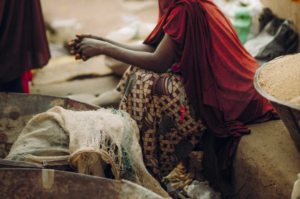
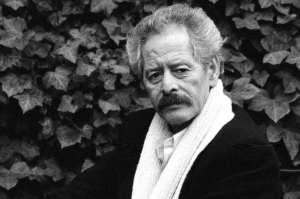
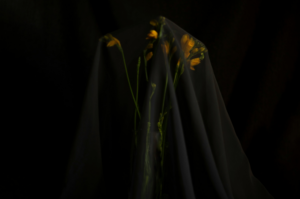

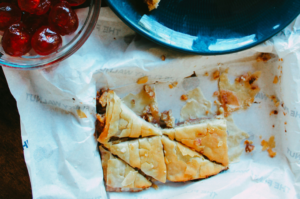
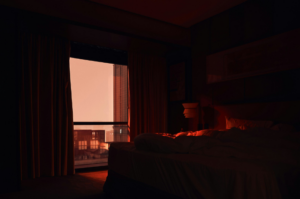

COMMENTS -
Reader Interactions